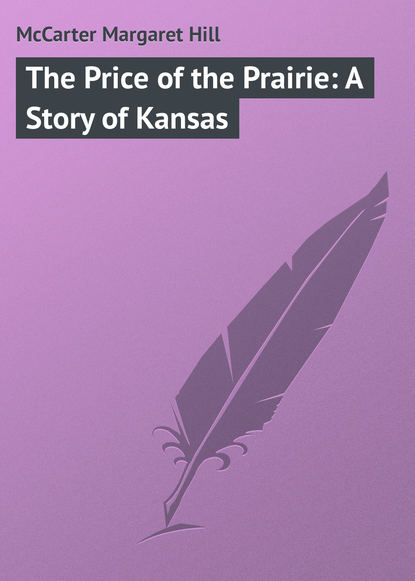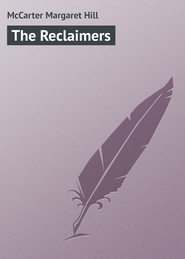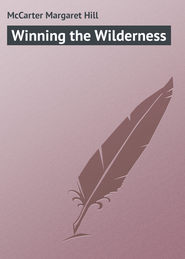По всем вопросам обращайтесь на: info@litportal.ru
(©) 2003-2024.
✖
The Price of the Prairie: A Story of Kansas
Автор
Год написания книги
2017
Настройки чтения
Размер шрифта
Высота строк
Поля
"To cool 'em off," O'mie whispered in my ear. "Nothin' so coolin' as a hot berry pie in July. Let's you and me go to the creek an' thaw out."
That evening Jean Pahusca found the jug supposed to be locked in Conlow's chest of tools inside his shop. I had found where that red forge light came from, and had watched it from my window many a night. When it winked and blinked, I knew somebody inside the shop was passing between it and the line of the chink. I did not speak of it. I was never accused of telling all I knew. My father often said I would make a good witness for my attorney in a suit at law.
Among the Indians who had come for their stipend on this annuity day was a strong young Osage called Hard Rope, who always had a roll of money when he went out of town. I remember that night my father did not come home until very late; and when Aunt Candace asked him if there was anything the matter, I heard him answer carelessly:
"Oh, no. I've been looking after a young Osage they call Hard Rope, who needed me."
I was sleepy, and forgot all about his words then. Long afterwards I had good reason for knowing through this same Hard Rope, how well an Indian can remember a kindness. He never came to Springvale again. And when I next saw him I had forgotten that I had ever known him before. However, I had seen the blinking red glare down the slope that evening and I knew something was going on. Anyhow, Jean Pahusca, crazed with drink, had stolen Tell Mapleson's pony and created a reign of terror in the street until he disappeared down the trail to the southwest.
"It's a wonder old Tell doesn't shoot that Injun," Irving Whately remarked to a group in his store. "He's quick enough with firearms."
"Well," said Cam Gentry, squinting across the counter with his shortsighted eyes, "there's somethin' about that 'Last Chance' store and about this town I don't understand. There's a nigger in the wood-pile, or an Injun in the blankets, somewhere. I hope it won't be long till this thing is cleared up and we can know whether we do know anything, or don't know it. I'm gettin' mystifieder daily." And Cam sat down chuckling.
"Anyhow, we won't see that Redskin here for a spell, I reckon," broke in Amos Judson, Whately's clerk. And with this grain of comfort, we forgot him for a time.
One lazy Saturday afternoon in early August, O'mie and I went for a swim on the sand-bar side of the Deep Hole under the Hermit's Cave. I had something to tell O'mie. All the boys trusted him with their confidences. We had slid quietly down the river; somehow, it was too hot to be noisy, and we were lying on a broad, flat stone letting the warm water ripple over us. A huge bowlder on the sand just beyond us threw a sort of shadow over our brown faces as we rested our heads on the sand.
"O'mie," I began, "I saw something last night."
"Well, an' phwat did somethin' do to you?" He was blowing at the water, which was sliding gently over his chest.
"That's what I want to tell you if you will shut up that red flannel mouth a minute."
"The crimson fabric is now closed be order av the Coort," grinned O'mie.
"O'mie, I waked up suddenly last night. It was clear moonlight, and I looked out of the window. There right under it, on a black pony just like Tell Mapleson's, was Jean Pahusca. He was staring up at the window. He must have seen me move for he only stayed a minute and then away he went. I watched him till he had passed Judson's place and was in the shadows beyond the church. He had on a new red blanket with a circle of white right in the middle, a good target for an arrow, only I'd never sneak up behind him. If I fight him I'll do it like a white man, from the front."
"Then ye'll be dead like a white man, from the front clear back," declared O'mie. "But hadn't ye heard? This mornin' ould Tell was showin' Tell's own pony he said he brought back from down at Westport. He got home late las' night. An' Tell, he pipes up an' says, 'There was a arrow fastened in its mane when I see it this mornin', but his dad took no notice whatsoever av the boy's sayin'; just went on that it was the one Jean Pahusca had stole when he was drunk last. What does it mean, Phil? Is Jean hidin' out round here again? I wish the cuss would go to Santy Fee with the next train down the trail an' go to Spanish bull fightin'. He's just cut out for that, begorra; fur he rides like a Comanche. It ud be a sort av disgrace to the bull though. I've got nothin' agin bulls."
"O'mie, I don't understand; but let's keep still. Some day when he gets so drunk he'll kill one of the grand jury, maybe the rest of them and the coroner can indict him for something."
We lay still in the warm water. Sometimes now in the lazy hot August afternoons I can hear the rippling song of the Neosho as it prattled and gurgled on its way. Suddenly O'mie gave a start and in a voice low and even but intense he exclaimed:
"For the Lord's sake, wud ye look at that? And kape still as a snake while you're doin' it."
Lying perfectly still, I looked keenly about me, seeing nothing unusual.
"Look up across yonder an' don't bat an eye," said O'mie, low as a whisper.
I looked up toward the Hermit's Cave. Sitting on a point of rock overhanging the river was an Indian. His back was toward us and his brilliant red blanket had a white circle in the centre.
"He's not seen us, or he'd niver set out there like that," and O'mie breathed easier. "He could put an arrow through us here as aisy as to snap a string, an' nobody'd live to tell the tale. Phil Bar'net, he's kapin' den in that cave, an' the devil must have showed him how to git up there."
A shout up-stream told of other boys coming down to our swimming place. You have seen a humming bird dart out of sight. So the Indian on the rock far above us vanished at that sound.
"That's Bill Mead comin'; I know his whoop. I wish I knew which side av that Injun's head his eyes is fastened on," said O'mie, still motionless in the water. "If he's watchin' us up there, I'm a turtle till the sun goes down."
A low peal of thunder rolled out of the west and a heavy black cloud swept suddenly over the sun. The blue shadow of the bluff fell upon the Neosho and under its friendly cover we scrambled into our clothes and scudded out of sight among the trees that covered the east bottom land.
"Now, how did he ever get to that place, O'mie?" I questioned.
"I don't know. But if he can get there, I can too."
Poor O'mie! he did not know how true a prophecy he was uttering.
"Let's kape this to oursilves, Phil," counselled my companion. "If too many knows it Tell may lose another pony, or somebody's dead dog may float down the stream like the ould hermit did. Let's burn him out av there oursilves. Then we can adorn our own tepee wid that soft black La Salle-Marquette-Hennepin French scalp."
I agreed, and we went our way burdened by a secret dangerous but fascinating to boys like ourselves.
CHAPTER IV
IN THE PRAIRIE TWILIGHT
The spacious prairie is helper to a spacious life.
Big thoughts are nurtured here, with little friction.
– QUAYLE.
By the time I was fifteen I was almost as tall and broad-shouldered as my father. Boy-like, I was prodigal of my bounding vigor, which had not tempered down to the strength of my mature manhood. It was well for me that a sobering responsibility fell on me early, else I might have squandered my resources of endurance, and in place of this sturdy story-teller whose sixty years sit lightly on him, there would have been only a ripple in the sod of the curly mesquite on the Plains and a little heap of dead dust, turned to the inert earth again. The West grows large men, as it grows strong, beautiful women; and I know that the boys and girls then differed only in surroundings and opportunity from the boys and girls of Springvale to-day. Life is finer in its appointments now; but I doubt if it is any more free or happy than it was in those days when we went to oyster suppers and school exhibitions up in the Red Range neighborhood. Among us there was the closest companionship, as there needs must be in a lonely and spacious land. What can these lads and lasses of to-day know of a youth nurtured in the atmosphere of peril and uncertainty such as every one of us knew in those years of border strife and civil war? Sometimes up here, when I see the gay automobile parties spinning out upon the paved street and over that broad highway miles and miles to the west, I remember the time when we rode our Indian ponies thither, and the whole prairie was our boulevard.
Marjie could ride without bridle or saddle, and she sat a horse like a cattle queen. The four Anderson children were wholesome and good-natured, as they were good scholars, and they were good riders. They were all tow-headed and they all lisped, and Bud was the most hopeless case among them. Flaxen-haired, baby-faced youngster that he was, he was the very first in all our crowd to learn to drop on the side of his pony and ride like a Comanche. O'mie and I also succeeded in learning that trick; Tell Mapleson broke a collar-bone, attempting it; and Jim Conlow, as O'mie said, "knocked the 'possum' aff his mug thryin' to achave the art." He fractured the bones of his nose, making his face a degree more homely than it was before. Then there were the Mead boys to be counted on everywhere. Dave went West years ago, made his fortune, and then began to traffic with the Orient. His name is better known in Hong-Kong now than it is in Springvale. He never married, and it used to be said that a young girl's grave up in the Red Range graveyard held all his hope and love. I do not know; for he left home the year I came up to Topeka to enlist, and Springvale was like the bitter waters of Marah to my spirit. But that comes later.
Bill Mead married Bessie Anderson, and the seven little tow-headed Meads, stair-stepping down the years, played with the third generation here as we used to play in the years gone by. Bill is president of the bank on the corner where the old Whately store stood and is a share-holder in several big Kansas City concerns. Bessie lost her rosy cheeks years ago, but she has her seven children; the youngest of them, Phil, named for me, will graduate from the Kansas University this year. Lettie Conlow was always on the uncertain list with us. No Conlow could do much with a horse except to put shoes under it. It was a trick of hers to lag behind and call to me to tighten a girth, while Marjie raced on with Dave Mead or Tell Mapleson. Tell liked Lettie, and it rasped my spirit to be made the object of her preference and his jealousy. Once when we were alone his anger boiled hot, and he shook his fist at me and cried:
"You mean pup! You want to take my girl from me. I can lick you, and I'm going to do it."
I was bigger than Tell, and he knew my strength.
"I wish to goodness you would," I said. "I'd rather be licked than to have a girl I don't care for always smiling at me."
Tell's face fell, and he grinned sheepishly.
"Don't you really care for Lettie, Phil? She says you like Bess Anderson."
Was that a trick of Lettie's to put Marjie out of my thought, I wondered, or did she really know my heart? I distrusted Lettie. She was so like her black-eyed father. But I had guarded my own feelings, and the boys and girls had not guessed what Marjie was to me.
It was about this time that Father Le Claire, a French priest who had been a missionary in the Southwest, began to come and go about Springvale. His work lay mostly with the Osages farther down the Neosho, but he labored much among the Kaws. He was a kindly-spirited man, reserved, but gentle and courteous ever, and he was very fond of children. He was always in town on annuity days, when the tribes came up for their quarterly stipend from the Government. Mapleson was the Indian agent. The "Last Chance," unable to compete with its commercial rival, the Whately house, had now a drug store in the front, a harness shop in the rear and a saloon in the cellar. It was to this "Last Chance" that the Indians came for their money; and it was Father Le Claire who piloted many of them out to the trails leading southward and started them on the way to their villages, sober and possessed of their Government allowance or its equivalent in honest merchandise.
From the first visit the good priest took to Jean Pahusca, and he helped to save the young brave from many a murdering spell.
To O'mie and myself, however, remained the resolve to drive him from Springvale; for, boylike, we watched him more closely than the men did, and we knew him better. He was not the only one of our town who drank too freely. Four decades ago the law was not the righteous force it is to-day, and we looked upon many sights which our children, thank Heaven, never see in Kansas.
"Keep out of that Redskin's way when he's drunk," was Cam Gentry's advice to us. "You know he'd scalp his grandmother if he could get hold of her then."
We kept out of his way, but we bided our time.
Father Le Claire had another favorite in Springvale, and that was O'mie. He said little to the Irish orphan lad, but there sprang up a sort of understanding between the two. Whenever he was in town, O'mie was not far away from him; and the boy, frank and confidential in everything else, grew strangely silent when we talked of the priest. I spoke of this to my father one day. He looked keenly at me and said quietly:
"You would make a good lawyer, Phil, you seem to know what a lawyer must know; that is, what people think as well as what they say."







